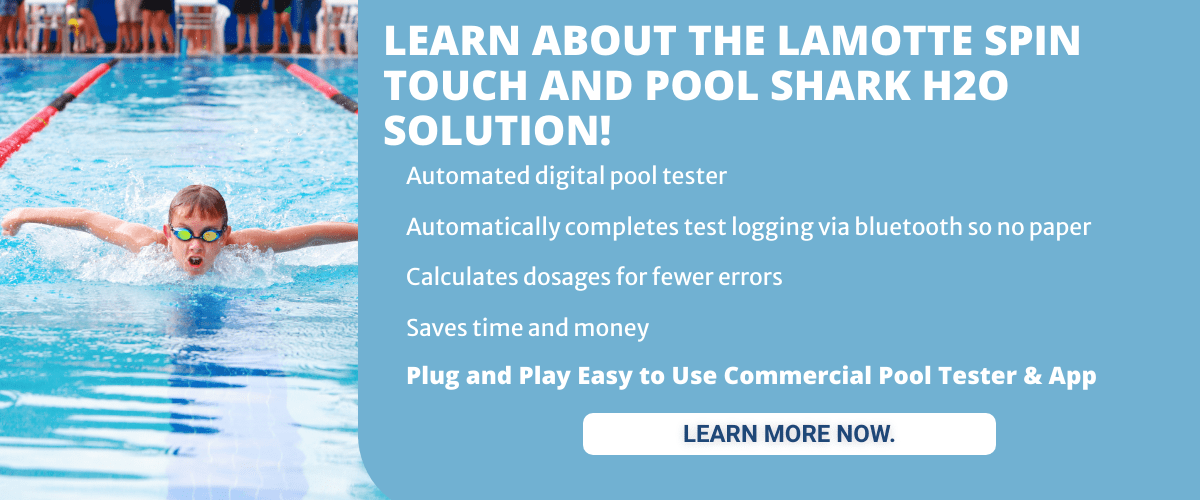Highlights:
- What is a saltwater pool?
- How saltwater pools differ from traditional chlorine pools
- What stays the same when it comes to saltwater pools and water chemistry
- Regulatory and compliance considerations for saltwater pool
- The bottom line on saltwater pools vs chlorine pools
- Frequently Asked Questions (FAQs)

Saltwater pools have gained popularity across hotels, recreation centers, and community facilities for their “softer” feel and perceived simplicity. Many guests—and even some operators—assume that saltwater pools are chlorine-free. In reality, that’s a misconception.
Saltwater pools do use chlorine, they just generate it differently.
For commercial operators, understanding how saltwater systems work, how they differ from traditional chlorine dosing, and what that means for water quality management is key to making an informed decision about which system best fits your facility’s needs.
What Is a Saltwater Pool?
A saltwater pool is equipped with a salt chlorine generator (also called a salt cell or chlorinator). Instead of manually adding chlorine gas, liquid bleach (sodium hypochlorite), or tablets, the system produces chlorine on-site from dissolved salt in the water.
Here’s how it works:
- Ordinary pool-grade salt (sodium chloride) is added to the water at a low concentration—typically around 3,000–3,500 ppm, far lower than the salt level of ocean water.
- As water passes through the salt cell, an electrical current splits the salt molecules (NaCl) into sodium (Na⁺) and chlorine gas (Cl₂).
- The chlorine gas dissolves into the water, forming hypochlorous acid (HOCl), the same active sanitizer found in traditional chlorinated pools.
- After disinfecting the water, the chlorine recombines into salt, and the process repeats continuously.
So yes, saltwater pools do contain chlorine. The difference lies not in what sanitizes the water, but in how it’s produced and managed.
How Saltwater Pools Differ from Traditional Chlorine Pools
While both systems rely on chlorine for disinfection, they differ in how that chlorine enters and behaves in the water, as well as in how operators manage it day-to-day.
- Chlorine Source
- Traditional Pools: Chlorine is added manually or through automated feeders as gas, liquid, or solid tablets.
- Saltwater Pools: Chlorine is generated continuously within the pool system using electrolysis.
Operational takeaway: Salt systems can reduce the need for manual chemical handling, but the pool still relies on chlorine chemistry for sanitation.
- Water Quality & Comfort
Saltwater pools are often described as feeling “softer” because the dissolved salt slightly enhances water buoyancy and reduces eye or skin irritation. However, this is true only if pH and chlorine levels are properly balanced.
If chemistry drifts, a saltwater pool can be just as irritating as any other. The difference is that the generator continuously produces chlorine at lower, steadier concentrations, which can minimize peaks and drops in residual levels.
- Maintenance Requirements
Saltwater pools may appear “low-maintenance,” but in commercial settings, that’s rarely the case. While operators handle fewer chemical deliveries, they must maintain salt cell performance and balance water chemistry with the same diligence.
Key maintenance considerations include:
- Salt cell cleaning: Regular removal of calcium scale buildup to maintain chlorine output.
- Monitoring salinity: Salt levels must stay within the manufacturer’s recommended range to avoid corrosion or system inefficiency.
- pH control: Electrolysis increases pH, requiring acid feed systems or automated pH control to maintain balance.
- Regular testing: Chlorine, pH, alkalinity, calcium hardness and pool stabilizer (CYA) still require daily or more frequent testing per your local code.
- Equipment and Corrosion Risks
Salt is mildly corrosive, particularly to metal components like ladders, railings, light fixtures, and heaters. In a well-balanced system, this risk is manageable, but neglected chemistry or splash-out areas can accelerate corrosion.
Operators should ensure:
- All metallic fittings are marine-grade stainless steel or properly coated.
- Deck and structural materials near the pool are compatible with saline environments.
- Regular rinsing and ventilation help prevent salt buildup.
- Operating Costs
While salt systems can reduce spending on bulk chlorine deliveries, they involve other costs:
- Initial installation of a generator and compatible control systems.
- Periodic salt cell replacement, typically every 3–7 years depending on use.
- Electricity consumption for electrolysis.
However, the steadier chlorine generation and reduced manual handling can provide operational convenience, especially for facilities with consistent bather loads.
Saltwater Pools and Water Chemistry: What Stays the Same
No matter the system, the fundamentals of water chemistry remain identical. Saltwater pools still require precise control of the same parameters as traditional chlorine pools:
- Free Chlorine: This will still be the active sanitizer and in saltwater pools, its ideal range is 1.0-4.0 ppm.
- pH: The ideal pH range is 7.2-7.8. This requires a close watch as pH tends to rise faster in salt systems.
- Total Alkalinity: Total alkalinity buffers pH to prevent big swings and should be maintained at 80-120 ppm.
- Calcium Hardness: Monitoring your pool’s calcium hardness helps prevent corrosion or scaling. It should be maintained between 200-400 ppm.
- Cyarunic Acid: Cyarunic acid, or pool stabilizer, helps prevent chlorine from UV degradation in outdoor pools and is still a necessity in a saltwater pool. Maintain this between 30-50 ppm.
- Salt: Maintain your saltwater pool’s salt at between 3,000-3,500 ppm.
Operators must test and document these readings daily (or per local code), as part of the facility’s Recreational Water Illness (RWI) prevention strategy.
Regulatory and Compliance Considerations of Saltwater Pools
Many health departments treat saltwater and chlorine pools under the same operational standards. The CDC’s Model Aquatic Health Code (MAHC) outlines identical testing, disinfection, and recordkeeping requirements for both systems.
Saltwater systems still need:
- Daily residual chlorine readings
- pH monitoring and adjustment
- Secondary disinfection systems (such as UV or ozone) in some jurisdictions
- Proper operator certification (such as Certified Pool Operator or its equivalent)
While saltwater pools automate chlorine production, they don’t automate accountability. Operators remain responsible for ensuring sanitizer effectiveness, maintaining balanced water, and protecting bathers from pathogens.
The Bottom Line
Yes, saltwater pools have chlorine. They simply make their own, on-site and on-demand.
For commercial and public operators, saltwater systems can simplify chemical handling and improve guest experience, but only with disciplined maintenance, proper water balance, and ongoing operator training. Whether your facility runs on bulk chlorine or salt generation, success comes down to the same fundamentals: clear water, stable chemistry, and a proactive approach to safety and compliance.
If you manage a commercial or public aquatic facility and are looking for water quality solutions that make your job easier, look no further than PoolShark H2O. Our advanced digital systems help you streamline water chemistry management, whether you’re running a traditional chlorine pool or a saltwater system with generator cells.
With PoolShark H2O you get:
- Easy logging and reporting features for compliance with health inspections
- Early-warning alerts so you can fix chemistry issues before they affect guests or equipment
- Accurate water chemistry calculations and accurate water quality records to help your staff to keep your facility operating at peak safety and guest-satisfaction levels
- Remote oversight for managers and owners and reduced risk and liability for the business
FAQs: Saltwater vs. Chlorine Pools
- Do saltwater pools have less chlorine?
Not exactly. The concentration of free chlorine in a properly balanced saltwater pool is about the same as in a traditional pool. The key difference is that the chlorine is produced continuously at a steady rate, rather than added in larger manual doses.
- Is a saltwater pool safer or healthier?
A well-maintained saltwater pool feels gentler because it avoids chlorine spikes, but it’s not inherently “safer.” Safety depends on maintaining correct sanitizer and pH levels. Poorly maintained salt systems can still harbor pathogens like Pseudomonas or Legionella.
- Does saltwater eliminate the need for chemical testing?
No, testing is still mandatory. Operators must check chlorine, pH, alkalinity, calcium hardness, and salinity daily. Automation assists with dosing but doesn’t replace verification or recordkeeping requirements.
- Which system is better for commercial facilities?
It depends on your goals. Saltwater systems are great for guest comfort and consistent residual control but come with higher initial costs and corrosion considerations. Traditional chlorine systems are often preferred in high-bather-load environments or where rapid adjustment and flexibility are critical. Many facilities find success blending both: traditional chlorine dosing for large pools and salt systems for smaller leisure or therapy pools.



